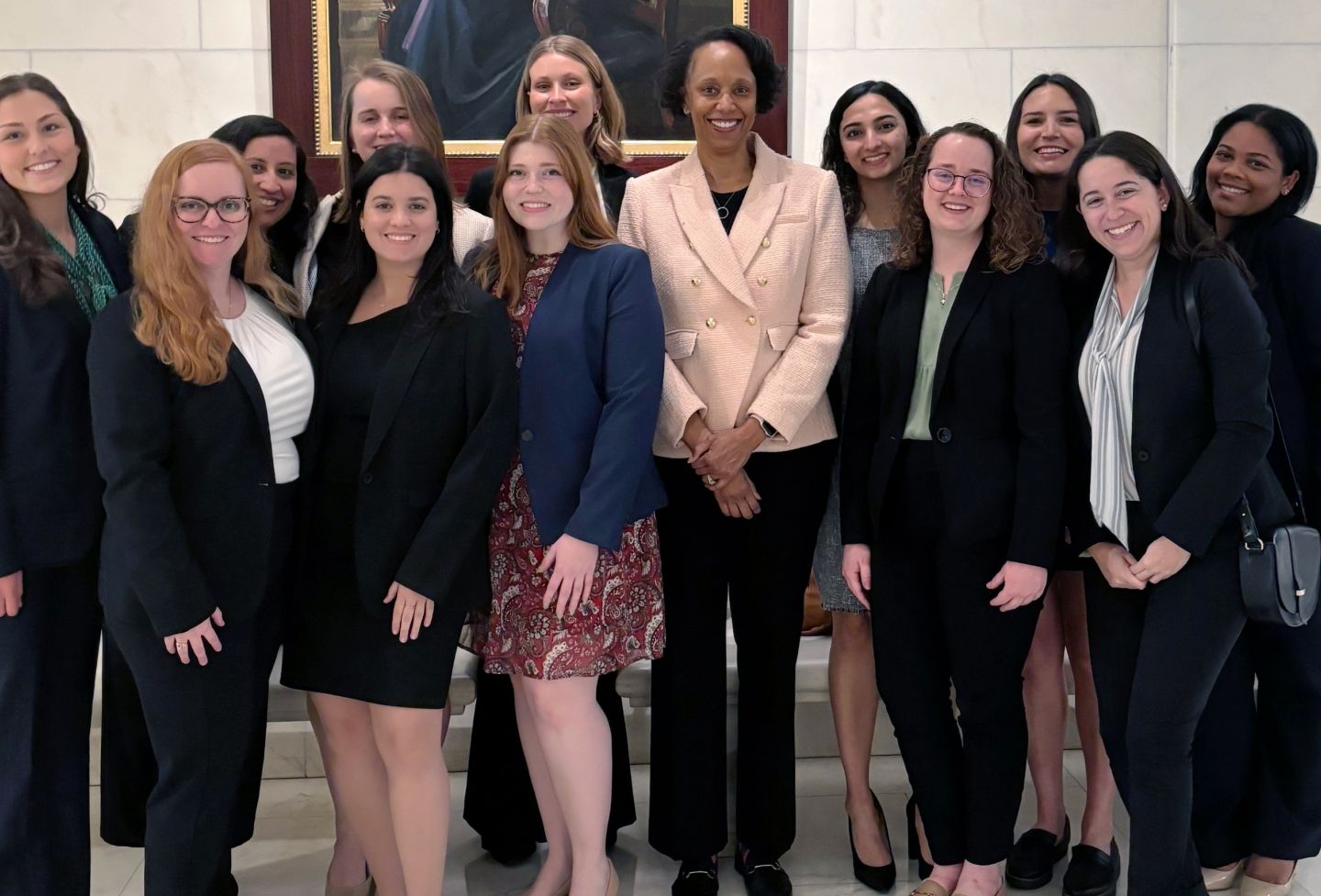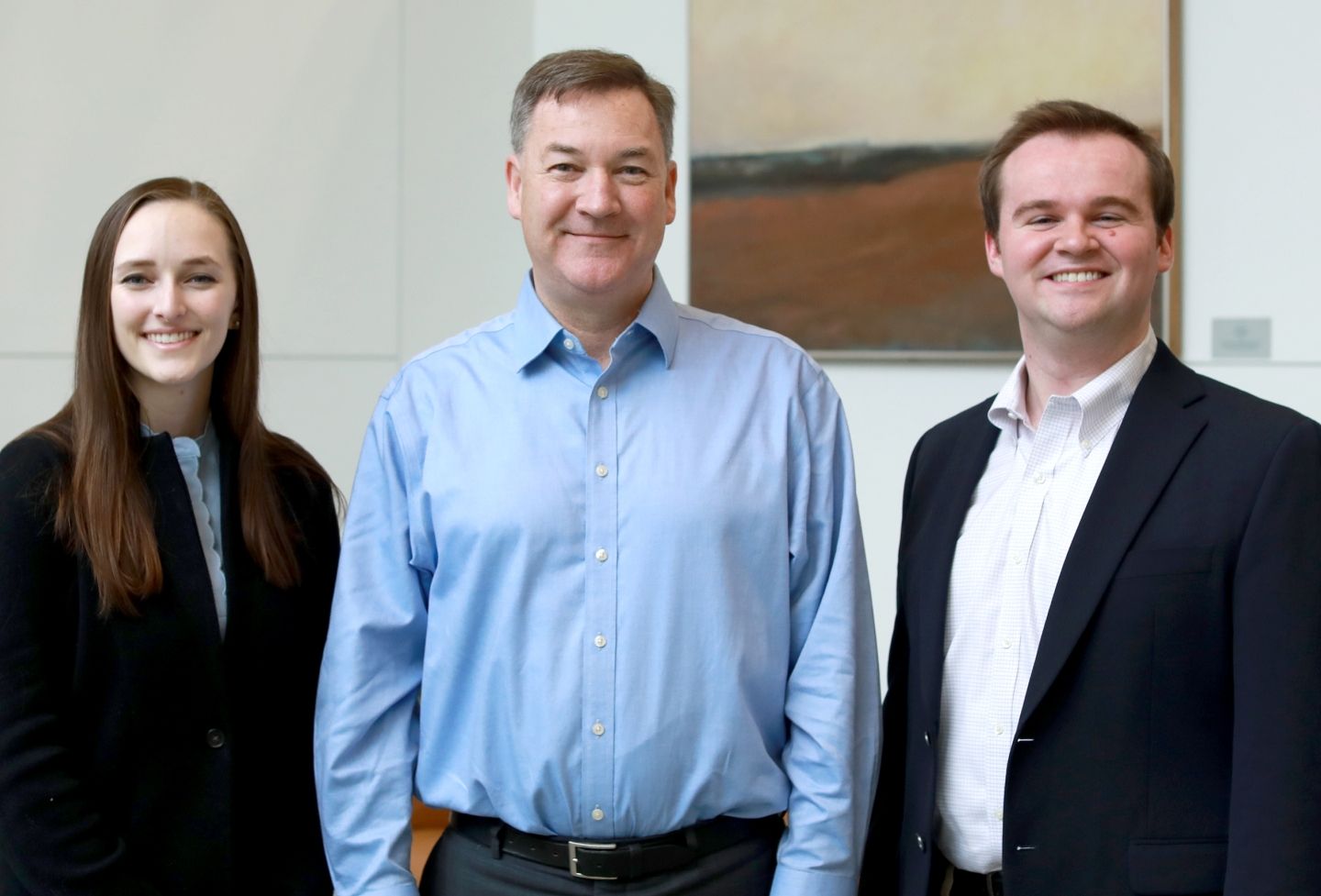University of Virginia School of Law students are getting rare insight into their potential careers through a new course that allows them to create and manage a hypothetical law firm.
Taught by Simpson Thacher & Bartlett partner Art Robinson over the course of four weekends this spring, Management of Big Law: Balancing Culture and Profit tasks students with deciding every aspect of their firm’s management — from location, to area of specialization, to compensation structure. The unique format of the class allows students to learn the inner workings of the firms they will soon be joining, providing them with invaluable experience in how these organizations function.
Robinson, a 1988 UVA Law graduate, is global head of the Capital Markets practice at Simpson Thacher, as well as a member of the Executive Committee and former chairman of the Business Development Committee at the firm, roles that make him uniquely suited to teach the course.
“The class is designed to educate the students about the environment in which they’re going to be entering as a new associate,” said Robinson, who is based in New York. “And as an associate, you tend to look at things from an associate perspective, and it takes time in any environment to get up to speed and learn the culture. The course aims to accelerate that process so that when students join their firms — whether it’s a national law firm, a global law firm, or a niche firm — they are able to think a bit more like the management committee of a law firm and be better equipped to understand context, variables and other considerations in their firm’s decision-making process.”
The course, which is offered through the John W. Glynn, Jr. Law & Business Program, takes students step by step through firm partners’ strategies. One of the first classes focused on the different compensation structures, such as lockstep (in which compensation is based on seniority), modified lockstep and more variable structures. Robinson said the class has led to some animated discussions, as students contemplate aspects of their profession that they have not previously been asked to confront.
“It’s very interesting, hearing students talk about the topics in a way that’s very similar to the way that law firm partners discuss challenges,” Robinson said. “For example, if we select a lockstep model of compensation, some people say, OK, well what’s going to be the incentive for people to work really hard? And other people counter: I trust my partners, that’s why we’re a partnership. I don’t want our firm to get too big. I want all of us to be in the same boat, and if partners are really misbehaving, then we can do something about it.”
At the start of the compensation conversation, Robinson told the class to assume that some associates are billing 2,700 hours and others are billing 1,900. In light of that, how should compensation be structured?
“Several of the students noted they would want to be paid more if they are working that much harder than others,” Robinson said. “But does that mean when that associate becomes a partner, he or she is going to fight other partners for more work and more money? In short, how various aspects of associate life are structured ultimately effects how partners behave and react to different situations.”
The course then moved on to other aspects of firm management, including the level of transparency that the firm would attempt to maintain and which committees partners would serve on. They also spent a weekend talking about the different aspects of partnership in the hypothetical firm (dubbed North Grounds LLP after the school’s location at UVA), including non-equity partners, lateral hires entering the firm, and how to handle partners who aren’t performing up to expectations.
The next weekend featured a guest lecture by a representative from CitiBank, the banker for many of the largest law firms, about how firms analyze their performance. That weekend’s classes also featured a case study regarding how a firm might handle a significant financial downturn. The final weekend will focus primarily on business development, with a member of Simpson Thacher’s business development team present.
Andrew Jones, a third-year law student in the course, said the class provides a rare chance to peek into the minds of students’ future bosses.
“It's shown us that every decision a firm makes can have an impact on the culture of the firm and the type of people it attracts,” Jones said. “Having Art Robinson guide our discussion is a treat, and it is opportunities like this that make UVA such a special place.”
Sarah Schrag, another third-year student, said, “The course has been extremely helpful with building perspective by filling in the pieces that affect profits and culture — hiring internally versus hiring laterals, determining timing on partner promotions, establishing compensation structures, analyzing overhead expenses, comparing the firm to successful peer firms, incentivizing collegiality, mentorship and diversity, and so forth. At various points in your career, you will be on one end or the other of a decision regarding this balance, and this course seeks to better prepare you for those moments.”
Robinson agreed that an important part of the class was giving students an understanding of the landscape they would soon be entering.
“I hope the students have a better sense for the decision-making process in the law firms they are joining, so that they can understand the culture of their firms more readily, and successfully transition to practice,” he said. “Firms today have a great need to remain economically attractive while at the same time preserving their culture — the sense of identity that makes each firm unique. It's important for students to understand that dynamic relationship between culture and profits as they progress in their career and decide if they are in the right firm and the best practice for their development and success, as they will devote so much of their time to their profession.”
Robinson said he’s been impressed by the course’s full enrollment, and with the students’ level of commitment.
“They assumed the mantle quickly, and the level of dialogue was as nuanced and balanced as you would think it would be with smart, sophisticated Virginia law students,” Robinson said. “They took it with the gravity that one would expect them to, and it has been very rewarding.”
Founded in 1819, the University of Virginia School of Law is the second-oldest continuously operating law school in the nation. Consistently ranked among the top law schools, Virginia is a world-renowned training ground for distinguished lawyers and public servants, instilling in them a commitment to leadership, integrity and community service.


